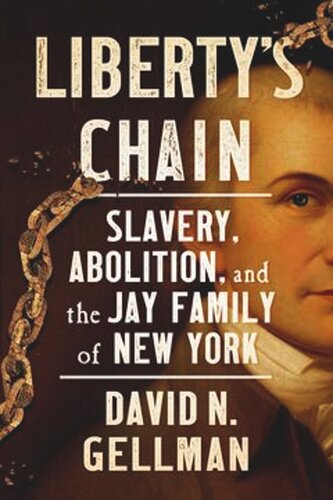

Most ebook files are in PDF format, so you can easily read them using various software such as Foxit Reader or directly on the Google Chrome browser.
Some ebook files are released by publishers in other formats such as .awz, .mobi, .epub, .fb2, etc. You may need to install specific software to read these formats on mobile/PC, such as Calibre.
Please read the tutorial at this link: https://ebookbell.com/faq
We offer FREE conversion to the popular formats you request; however, this may take some time. Therefore, right after payment, please email us, and we will try to provide the service as quickly as possible.
For some exceptional file formats or broken links (if any), please refrain from opening any disputes. Instead, email us first, and we will try to assist within a maximum of 6 hours.
EbookBell Team

4.1
90 reviewsIn Liberty's Chain, David N. Gellman shows how the Jay family, abolitionists and slaveholders alike, embodied the contradictions of the revolutionary age. The Jays of New York were a preeminent founding family. John Jay, diplomat, Supreme Court justice, and co-author of the Federalist Papers, and his children and grandchildren helped chart the course of the Early American Republic.
Liberty's Chain forges a new path for thinking about slavery and the nation's founding. John Jay served as the inaugural president of a pioneering antislavery societies. His descendants, especially his son William Jay and his grandson John Jay II, embraced radical abolitionism in the nineteenth century, the cause most likely to rend the nation. The scorn of their elite peers—and racist mobs—did not deter their commitment to end southern slavery and to combat northern injustice.
John Jay's personal dealings with African Americans ranged from callousness to caring. Across the generations, even as prominent Jays decried human servitude, enslaved people and formerly enslaved people served in Jay households. Abbe, Clarinda, Caesar Valentine, Zilpah Montgomery, and others lived difficult, often isolated lives, that tested their courage and the Jay family's principles.
The personal and the political intersect in this saga, as Gellman charts American values transmitted and transformed from the colonial and revolutionary eras to the Civil War, Reconstruction, and beyond. The Jays, as well as those who served them, demonstrated the elusiveness and the vitality of liberty's legacy. This remarkable family story forces us to grapple with what we mean by patriotism, conservatism, and radicalism. Their story speaks directly to our own divided times.